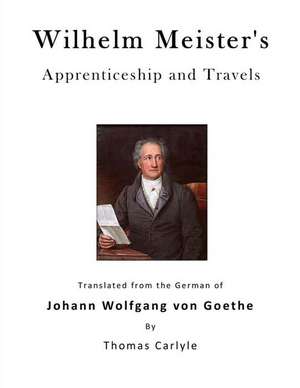Wilhelm Meister's Apprenticeship and Travels
Autor Johann Wolfgang Von Goethe Traducere de Thomas Carlyleen Limba Engleză Paperback
Wilhelm Meister's
Apprenticeship and Travels
Translated from the German of Johann Wolfgang von Goethe
By Thomas Carlyle
Wilhelm Meister's Apprenticeship (German: Wilhelm Meisters Lehrjahre) is the second novel by Johann Wolfgang von Goethe, published in 1795-96.
Goethe's work on the novel began in the 1770s. An early version of the work, unpublished during Goethe's lifetime, was discovered in the early twentieth century, and published under the title Wilhelm Meister's Theatrical Calling (Wilhelm Meisters theatralische Sendung). When the Apprenticeship was completed in the mid-1790s, it was to a great extent through the encouragement and criticism of Goethe's close friend and collaborator Friedrich Schiller that it took its final shape. Wilhelm Meisters Wanderjahre ("Wilhelm Meister's Journeyman Years"), the sequel to the Apprenticeship, was already planned in the 1790s, but did not appear in its first edition until 1821, and in its final form until 1829.
The novel has had a significant impact on European literature. Romantic critic and theorist Friedrich Schlegel judged it to be of comparable importance for its age as the French Revolution and the philosophy of Johann Gottlieb Fichte. Arthur Schopenhauer cited Wilhelm Meister's Apprenticeship as one of the four greatest novels ever written. Schopenhauer also mentions the book in his Aphorismen zur Lebensweisheit.
Arguing against chasing transient pleasures, Schopenhauer says, "Where we were looking for pleasure, happiness and joy, we often find instruction, insight and knowledge, a lasting and real benefit in place of a fleeting one. This idea runs like a bass-note through Goethe's Wilhelm Meister; for this is an intellectual novel and is of a higher order than the rest."
Wilhelm Meister's Apprenticeship provided the text for many lieder, among others by Beethoven, for example Sehnsucht: Gedicht von Goethe viermal in Musik gesetzt von L. van Beethoven, four settings of "Nur wer die Sehnsucht kennt," WoO. 134 (1808), and by Schubert, for example D 877, Gesange aus Wilhelm Meister, Op. 62 (1826).
The 1866 opera Mignon by Ambroise Thomas is based on Wilhelm Meister's Apprenticeship.
Preț: 94.58 lei
Nou
18.10€ • 19.35$ • 15.09£
Carte disponibilă
Livrare economică 27 martie-10 aprilie
Specificații
ISBN-10: 152331074X
Pagini: 220
Dimensiuni: 216 x 279 x 12 mm
Greutate: 0.52 kg
Editura: CreateSpace Independent Publishing Platform
